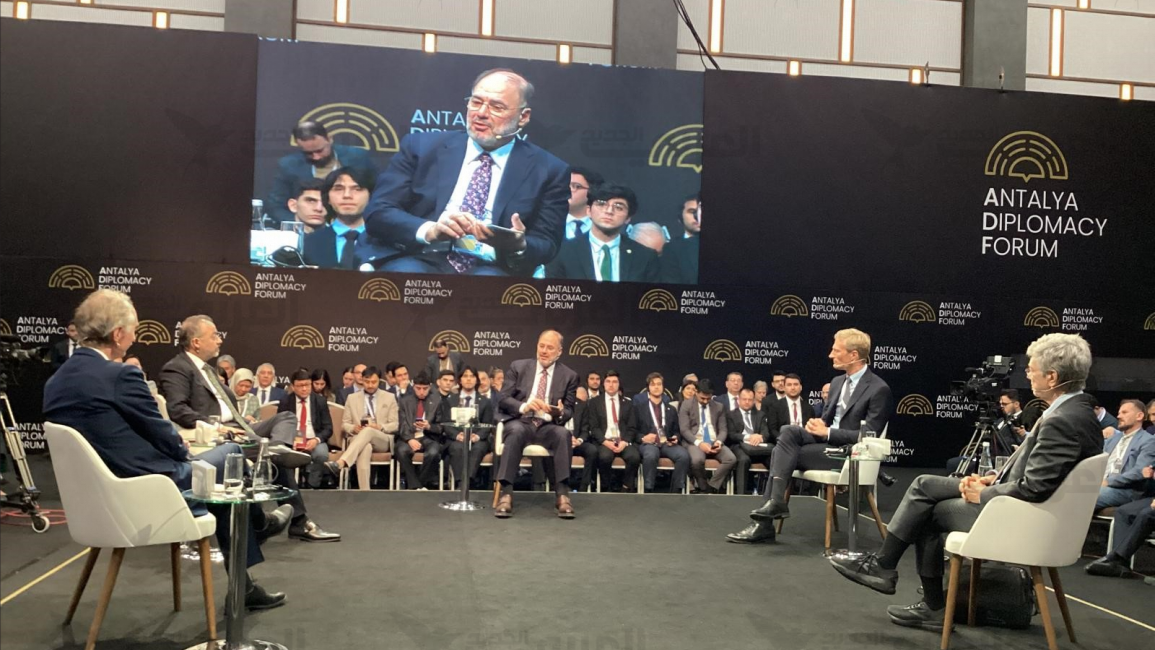A panel discussion on Syria, held Saturday at the Antalya Diplomatic Forum in Turkey, proceeded without a single Syrian speaker—a conspicuous omission that drew immediate questions from the audience and sparked criticism over representation.
Turkish Deputy Foreign Minister Nuh Yilmaz addressed the issue, stating that Syrian Foreign Minister Asaad al-Shaibani had been scheduled to participate but was compelled to leave due to unforeseen travel. However, his explanation did not prevent an attendee from questioning why no Syrian voice was present at a session titled “Syria Between Reconstruction and Reconciliation.”
The panel included Yilmaz, United Nations Special Envoy for Syria Geir Pedersen, Deputy Executive Director of the World Food Programme Carl Skau, and Jeffrey Sachs, President of the UN Sustainable Development Solutions Network. It was moderated by Wadah Khanfar, President of the Al-Sharq Forum.
During the discussion, Yilmaz cited a recent poll indicating that two-thirds of Syrians are reportedly satisfied with the performance of President Ahmad al-Sharaa and his transitional government. He added that Turkey maintains close coordination with Syrian authorities in rejecting Israeli airstrikes on Syrian territory, describing the attacks as evidence of Israel’s “expansionist policy,” which he said fuels chaos and instability in the region. He also confirmed that Turkey is reviewing recent security cooperation requests from the Syrian government.
Pedersen: Sanctions Undermine Syria’s Recovery
UN Envoy Geir Pedersen reiterated his call for lifting international sanctions on Syria, arguing that they significantly hinder reconstruction efforts and worsen the lives of ordinary Syrians. He noted that the sanctions, mostly inherited from the Assad era, continue to cripple the country’s banking system, energy sector, and overall economy.
“Syrians are looking forward to seeing President al-Sharaa’s promises fulfilled—not only on the economic front but also in terms of national reconciliation,” Pedersen said. While affirming that the UN is actively working with the Syrian government to meet humanitarian needs, he stressed that international support is essential: “The UN alone cannot succeed.” He also warned that Israel is “playing with fire” through its repeated strikes on Syrian territory.
Sachs: U.S. Bears Responsibility for Post-2011 Conflict
Jeffrey Sachs delivered a sharp critique of U.S. foreign policy, holding Washington largely responsible for the protracted violence in Syria since 2011. He accused the U.S. of consistently supporting Israel—despite its repeated attacks on Syria—and backing militant groups within the country. Sachs also alleged that Washington had funneled support to extremist factions, further exacerbating the conflict.
Carl Skau of the World Food Programme provided a sobering update on Syria’s humanitarian crisis, reporting that over three million Syrians are suffering from severe food shortages. He warned that the country’s ongoing food insecurity threatens to further destabilize the population and called for increased funding to enable the WFP to carry out its mandate.
Al-Sharaa Present at Forum Opening
Although absent from the Syria panel, President Ahmad al-Sharaa attended the forum’s opening session on Friday. In his remarks, he emphasized that Syria’s security is integral to Turkey’s own stability and reaffirmed Damascus’s commitment to cooperating with all relevant actors—including the United States and Russia—to advance the Syrian political process.
Later that evening, al-Sharaa met with Turkish President Recep Tayyip Erdoğan on the sidelines of the forum. According to a statement from the Turkish Presidency’s Directorate of Communications, Erdoğan expressed support for Syria’s stabilization efforts and pledged continued diplomatic engagement to lift international sanctions on Damascus.
“We will not allow those who seek to plunge Syria back into chaos to succeed,” Erdoğan reportedly told al-Sharaa, adding that the coming years would bring “stability, prosperity, and peace” to Syria.
Despite the high-level rhetoric of cooperation and reconciliation, the absence of Syrians on a panel about their own country’s future was a stark reminder of how international diplomacy on Syria often proceeds without direct Syrian participation—a contradiction that many observers believe must be addressed if meaningful, inclusive dialogue is to take place.
This article was translated and edited by The Syrian Observer. The Syrian Observer has not verified the content of this story. Responsibility for the information and views set out in this article lies entirely with the author.


